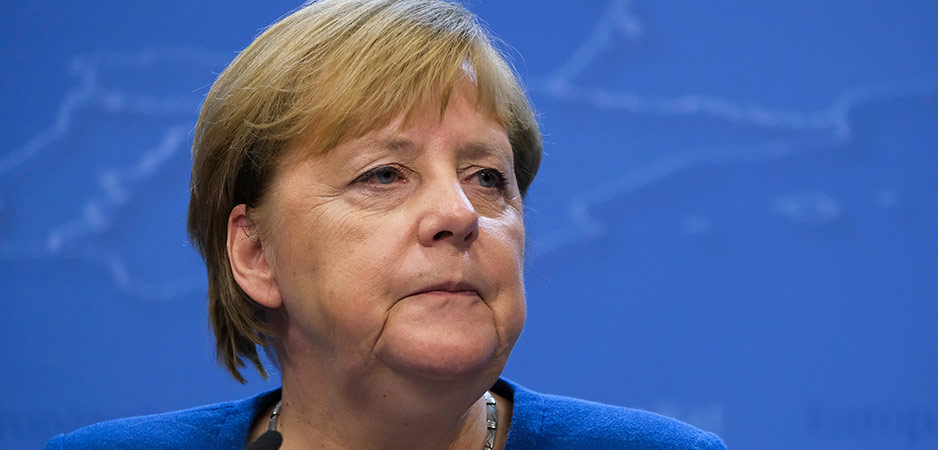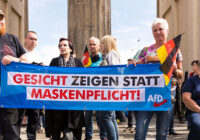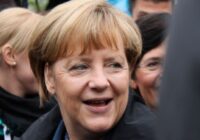In 2015, the European refugee crisis awoke Germans from a long and comforting slumber that Angela Merkel had lulled them into with her political style. The term “asymmetric demobilization” came to be known as a way of describing the German chancellor’s shrewd strategy of sitting on the fence and thereby winning elections. Merkel weakened her political competitors by avoiding controversial issues and, in doing so, choking off debate. Simultaneously, she adopted popular policy stances of her opponents and demobilized their potential voters.
Angela Merkel: A Retrospective
This opportunistic strategy, with the retention of power as the main objective, was devoid of a vision and an ideological foundation. The German magazine Der Freitag put it succinctly back in 2012: “She is pragmatic and non-ideological — like many Germans. Only what the Chancellor stands for, no one knows.”
Merkel’s reserved and pragmatic governing style hardly left room for symbolism. One of the few symbols associated with her was the famous diamond hand gesture, known as the “Merkel rhombus.” During the refugee crisis, Merkel abruptly left her trodden path of asymmetric demobilization. The symbolism and emotional outbursts caused by her course of action and its consequences astounded not only the German public, but it might have surprised the chancellor herself.
Driven by Deep Conviction
At the height of the crisis, her deliberative rhetoric yielded to impassioned pleas for a liberal, open-minded Germany. Merkel’s most famous but polarizing catchphrase, “We can do this,” rallied Germans behind the “decision of her lifetime” to grant entry to hundreds of thousands of refugees and migrants. Wearing her heart on her sleeve, Merkel responded to critics in September 2015, saying, “If we now have to apologize for showing a friendly face in emergency situations, then this is not my country.”
Sigmar Gabriel, a former leader of the Social Democratic Party (SPD) and the federal minister for economic affairs and energy at the time of the crisis, recalls Merkel’s conviction-driven view on the refugee influx. While debating the potential closure of German borders, Merkel replied, “But promise me one thing, Mr. Gabriel, we won’t build fences.” Looking back, Gabriel reflects, “I can still see her shaking her head … I remember thinking, this is not a superficial position, it was deep inside her.” Merkel had grown up during the Cold War in East Germany and had considered fleeing a dictatorial regime and repression herself.
For that rare occasion, Merkel granted a glimpse into her convictions and let emotion visibly influence her actions. Unsurprisingly, this led to a reciprocation in emotional reactions. Not only did it expose her to hate from the (far) right that blossomed due to her decision, but it also resulted in symbolic affection — the likes she had rarely received before. Refugees in Budapest, the Hungarian capital, with their sights set on their final destination, chanted, “Germany! Germany!” Others posted love letters on social media after the news broke that Germany would temporarily suspend the European Union’s Dublin Regulation, which “states that asylum seekers must have their applications processed in the EU country in which they first arrive.” A selfie between Syrian refugee Anas Modamani and Merkel went viral.
Mother Merkel and the Asylum Row
More than five years later, Merkel’s tenure as chancellor is drawing to a close this fall as German voters head to the polls. In October 2018, most refugees in Germany met the news of her resignation as party leader and decision not to stand in the next election with disappointment and gratitude.
Aras Bacho arrived in Germany from Syria in August 2015 and expressed his thoughts on her retirement from politics in passionate and sentimental — hence not typically German — terms. In an article on Vice, he wrote: “I am very sad about Merkel’s decision. The woman who gave me hope and future wants to leave? This is unimaginable, and I think other candidates for the chancellorship are unqualified. I hope that I will get up tomorrow and that it was all just a dream. For me, Germany without Merkel is like bread without butter.” He added that for refugees, “she is like a mother who looks after her children. Many refugees, including myself, have found a great love in Merkel.”
Bacho also touched upon concerns about a future in Germany without Merkel, who, according to him, acted “like a shield” in an increasingly polarized society. “Another chancellor would never have sacrificed herself for people who fled the war. She sacrificed her future for us, for which Merkel is hated … by a minority that is against us,” he said.
If Merkel was a shield for refugees, that shield started to crack during her time in office. Soon after her controversial decision to open Germany’s borders, public support for her migration policies dwindled. As a result, the government sped up deportations of migrants who had little chance of being recognized as refugees in Germany. Yet this wasn’t enough for the Christian Social Union (CSU), the sister party of Merkel’s Christian Democratic Union (CDU).
During the infamous “asylum row” in 2018, the CSU’s party leader, Horst Seehofer, demanded an even tougher stance on migration by turning back asylum seekers at the German border. A rebellion was on hand with the government and chancellor’s future on the line. A bruised Angela Merkel survived the onslaught but had to surrender large parts of her liberal approach to migration in an attempt to cling to power. As intra-party and public opinion turned against her, Merkel also refrained from her buoyant catchphrase, “We can do it!” Instead, she appeased skeptical supporters during the general election campaign in 2017 by saying, “A year like that cannot and should not ever happen again.”
Refugees Now Live in a Split German Society
Merkel changed the societal face of Germany by allowing an influx of 890,000 refugees and migrants in 2015 alone. By setting aside her usual cautious style of the politics of consensus and power retention, she exposed herself to two opposing sentiments.
On the one hand, the adulation that refugees had for Merkel seems unrelenting. They have settled in Germany, leaving behind political turmoil in their home countries after often arduous journeys. Statistics show steady progress regarding their integration into German society. About 50% of refugees who fled to Germany since 2015 have found a job. Now, most live in their own apartments. In schools, children and young people from refugee families usually integrate well. According to a study by the Federal Office for Migration and Refugees, conducted annually since 2016, refugees are almost as happy with life as Germans themselves.
On the other hand, Merkel left behind a split society in which the once predominant “climate of welcome” has subsided. A majority of Germans now reject her refugee policies. Refugees and migrants often have to bear the wrath directed against Merkel and her policies. The crisis and its consequences have led to increased radical-right violence against refugees and the radicalization of right-wing extremist groups. As a result, the Alternative for Germany (AfD) established itself as a far-right party, serving as a mouthpiece for the radical right.
The refugee crisis has thrown German society out of balance, bringing to the surface hidden feelings of injustice and loss of trust in democratic institutions. The COVID-19 pandemic has exacerbated these feelings. Reminiscent of the Capitol Hill insurrection in Washington on January 6, a group of right-wing extremists and conspiracy theorists attempted to storm the German parliament in August 2020. Similar to the US, German democracy has edged closer to a tipping point.
That poses a particular danger to the vulnerable group of refugees. Their fears of having to endure the same instability they had fled are rising. Angela Merkel’s unprecedented handling of the refugee crisis might be justifiably disputable, but protecting refugees by taking a firm stand against extremism should not.
The views expressed in this article are the author’s own and do not necessarily reflect Fair Observer’s editorial policy.
Support Fair Observer
We rely on your support for our independence, diversity and quality.
For more than 10 years, Fair Observer has been free, fair and independent. No billionaire owns us, no advertisers control us. We are a reader-supported nonprofit. Unlike many other publications, we keep our content free for readers regardless of where they live or whether they can afford to pay. We have no paywalls and no ads.
In the post-truth era of fake news, echo chambers and filter bubbles, we publish a plurality of perspectives from around the world. Anyone can publish with us, but everyone goes through a rigorous editorial process. So, you get fact-checked, well-reasoned content instead of noise.
We publish 2,500+ voices from 90+ countries. We also conduct education and training programs
on subjects ranging from digital media and journalism to writing and critical thinking. This
doesn’t come cheap. Servers, editors, trainers and web developers cost
money.
Please consider supporting us on a regular basis as a recurring donor or a
sustaining member.
Will you support FO’s journalism?
We rely on your support for our independence, diversity and quality.






